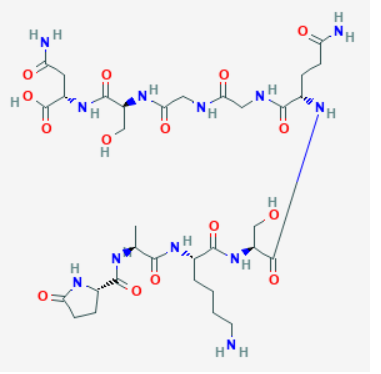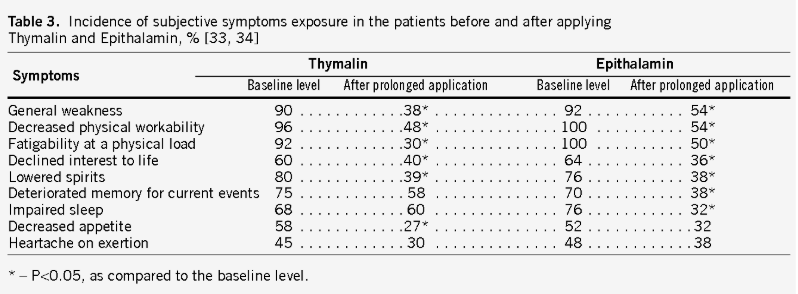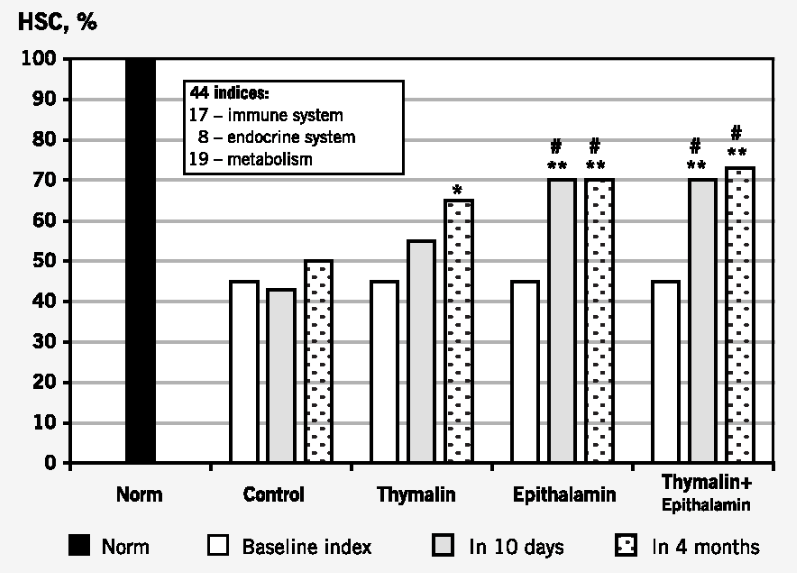Thymalin is the synthetic version of thymulin, which was isolated from the thymus in 1977. Thymalin has been shown to play a role in regulating inflammation and pain, has neuroprotective effects, and is important in immune function. Early research revealed that thymalin and other extracts of the thymus and pineal gland can prolong life.

Sequence: Pyr-Ala-Lys-Ser-Gln-Gly-Gly-Ser-Asn
Molecular Formula: C33H54N12O15
Molecular Weight: 858.864 g/mol
PubChem CID: 3085284
CAS Number: 63958-90-7
Synonyms: Thymulin, Thymic Factor, Nonathymuli, Facteur Thymique Serique, Serum Thymic Factor
Research in Russia at the turn of the 21st century revealed that thyamlin has a normalizing effect on a number of baseline physiologic functions in elderly adults. Older adults in the study experienced improvements in cardiovascular, immune, and nervous system function. They also showed improved metabolism as well as a trend toward homeostasis typical of a much younger person. Overall, the study revealed major decreases in acute respiratory disease, hypertension, osteoporosis, ischemic heart disease, and symptoms of arthritis. There was a 2-fold reduction in the mortality rate in the population taking thymalin over the course of the trial[1].
Thyamlin appears to by synergistic with certain other thymic and pineal gland isolates, decreasing mortality rate by as much as 4-fold when combined with epithalmin[2]. This is not surprising given that both the thymus and pineal gland have been linked to one another in the aging process. In fact, the pineal gland, when functioning optimally, protects the thymus from the degenerative effects of age[3].

Subjective changes in symptoms of patients before and after thymalin and epithalamin (Epithalon) administration
A great deal of research into the effects of thymalin on the immune system has revealed that the peptide primarily alters cellular immunity, changing levels of lymphocyte subpopulations, affecting T-cell differentiation, and altering natural killer (NK) cell activity[4], [5]. This is important as a number of chronic medical conditions, such as diabetes, lead to imbalances in cellular immunity that slowly evolve into serious immunosuppression with resultant increased susceptibility to everything from infection to cancer.
In patients with diabetic retinopathy, administration of thymalin leads to immune correction and a proliferation of T-lymphocytes, which in turn leads to decreased inflammation and slower progression of t he disease[6]. This same benefit may apply in the chronic immunodeficiency/immune dysregulation of HIV. The combination of highly active anti-retroviral therapy (HAART) with thymalin may even to reverse damage to the immune system and increase numbers of CD4+ T-cells in patients with HIV[7].
Thymalin is also being investigated as a potential adjuvant to an HIV vaccine as research indicates that it can boost T-cell responses to vaccines and lead to greater protection. This function of thymalin may make it one of the most important vaccine adjuvants ever developed, allowing for vaccines to be administered less often and/or in lower doses using less virulent pathogens[8]. This could make vaccines safer and more effective.
Research in rats that have undergone removal of the thyroid gland indicates that they usually experience a decline in thymic function followed by loss of weight and reductions in cell proliferation. Administration of thymalin appears to reverse these changes or prevent them from occurring in the first place. The net results are improved immune function, reduced risk of infection, and overall better health[9].

Effects of thymalin and epithalamin on immune and endocrine function as well as metabolism.
Research in mice shows that thymalin may be an effective adjuvant to pulsed laser radiation used to treat certain types of cancer. Neodymium lasers are frequently used to treat cancerous and precancerous skin lesions (including melanoma) with moderate to high rates of success[10]. The technique is particularly useful for preventing metastasis[11]. The benefits of pulsed laser therapy may be extended, however, through the simultaneous administration of thymalin, which has been shown to boost numbers of antibody producing cells in the spleen when administered in conjunction with laser therapy[12]. It is thought that this may have a greater suppressive effect on the tumor and help to achieve higher rates of remission or cure.
Thymalin need not be combined with laser therapy to have an effect on cancer, however. Research in rats shows that sub-therapeutic doses of thymalin have significant anti-tumor effects, causing tumor growth arrest in nearly 80% of cases and regression of the tumor in more than half of the animals in the experiment[13].
Thymalin has also shown benefit in the treatment of chronic lympholeukemia when combined with plasmapheresis. In this setting, the peptide/plasmapheresis combination is more effective at producing hematological compensation than standard chemotherapeutic agents. The treatment also improved activity in the lymphoid system[14]. In other words, thymalin hastens the return of the blood system to a state of homeostasis when combined with plasmapheresis and leads to more rapid clinical and blood-based measures of remission[15].
Psoriasis is a specific inflammatory condition that affects the skin and joints. Combining standard treatments for psoriasis with thymalin has been shown in clinical studies to result in improved laboratory measures of the condition. Importantly, these improvements in laboratory measures of psoriasis activity correlate well with improvement in a patient’s clinical status[16]. This indicates that thymalin has a measurable, observable effect on the status of the disease.
Research in patients with severe progressive pulmonary tuberculosis were given standard antibiotic therapy or antibiotic therapy plus thymalin. The groups given thymalin showed substantial increases in rates of clinical cure compared to their antibiotic-only counterparts. Even more encouraging was that specifically tailoring the thymalin/antibiotic therapy to the needs of the patient resulted in a nearly 95% cure rate[17]. This is important as tuberculosis is becoming increasingly resistant to standard and even experimental antibiotic regimens that include anywhere from one to four separate antibacterial drugs. Thymalin is particularly effective if given early in the course of the infection[18].
These findings should come as no surprise given that patients with severe tuberculosis show higher depression of cellular immunity as measured by T-cell numbers. Not only are the T-cells less numerous in this population, they are less capable of blast-transformation. When combined with an immunosuppressive disease, like diabetes, the decline in cellular immunity is even more dramatic[19]. Thymalin appears to be able to rescue the immune system in this setting, allowing the body to more effectively fight off infection.
Research indicates that patients suffering from the inflammatory kidney disease chronic glomerulonephritis may benefit from thymalin administration. In a clinical study of Russia patients, individuals treated with thymalin showed improvements in kidney function and blood indicies of inflammation. They also showed improvements in immunologic measurements of the disease that may lead to an overall decrease in damage to the kidney and thus remission or, at the very least, a delay in the time to dialysis/transplant[20].
Evidence from rats has linked changes in thymic factors to changes in circadian rhythms, which, in turn, have been linked to changes in cellular and humoral immunity. The research suggests that seasonal changes in the day-night cycle alter peak levels of thymus function, resulting in suppression of the immune system. This finding, which includes changes in antibody levels, may indicate why colds and the flu are so much more common during the shorter days of winter. It also may explain why the elderly are more prone to infection as we often experience changes in their circadian rhythm as we age. Administration of thymalin does not reset circadian cycling, but it does correct the immune deficiency associated with changes in sleep-wake cycles[21]. This may make thymalin an effective way of preventing infection, perhaps more effective even than some vaccines, like the flu vaccine.
Heart disease is easier to prevent than it is to treat. Once present, heart disease can only be reversed through extreme dieting and even then the process takes a great deal of time and dedication. Research in rabbits indicates that thymalin may both prevent and reverse heart disease by reducing lipid levels and by directly affecting the lymphocytes responsible for removing plaque from the walls of arteries. Research suggests that thymalin normalizes T-cell suppressor activity and sensitivity to the very things that cause atherosclerosis in the first place, reducing or eliminating the immune dysfunction that leads to plaque formation[22]. In short, thymalin appears to reduce the dysfunction that normally causes the immune system to fail to combat heart disease.
Research out of Russia indicates that thymalin may be an effective means of preventing infection and inflammatory complications following surgery[23]. Besides blood clots, infection is the single largest complication of sugery. Infection, particularly following orthopedic surgery, is a major cause of death in postoperative patients. Anything that reduces the risk of postoperative infection could be a major boon for healthcare, making it possible to operate on patients that might otherwise be deemed too high of a risk and reducing the adverse event rate associated with major surgical procedures.
Periodontitis is an inflammation of the gums and the structures that support the teeth. It can be painful, but is, more importantly, a common cause of tooth loss. Periodontitis is an easy condition to prevent with regular visits to the dentist and proper oral hygiene, but is very difficult to treat once it is established. Research suggests that thymalin can reduce inflammation in this setting and boost the appropriate cellular immune components necessary for combating the bacteria that are the root cause of periodontitis[24].
Changes in the circulating levels of thyroid hormones are quite common in the setting of anorexia nervous. This is thought to lead to changes in peripheral lymphocyte levels and to the depression of immune function often seen in this population. Administration of thymalin appears to counteract the immune changes of anorexia nervous and may even help to reverse the thymic atrophy seen in these patients[25]. It is important to note that, because thymalin requires zinc to function, patients with anorexia would require zinc supplementation in addition to thymalin to ensure maximum function. Clinical research is ongoing.
Research, so far, has revealed that the major benefits of thymalin are primarily a consequence of the peptide’s impact on cellular immune function. By boosting cellular immunity, particularly the function of T-cells, thymalin helps to restore normal balance to the body in ways that fight infection, reduce cancer progression, ward off heart disease, and reduce levels of inflammation and dysfunction. Though research is ongoing, some clinical uses of thymalin have already been standard therapy for years. There is even hope that thymalin may help to boost the effectiveness of both vaccines and antibiotics, something that cannot come to soon in a world plagued with an ever-growing number of drug-resistant superbugs.